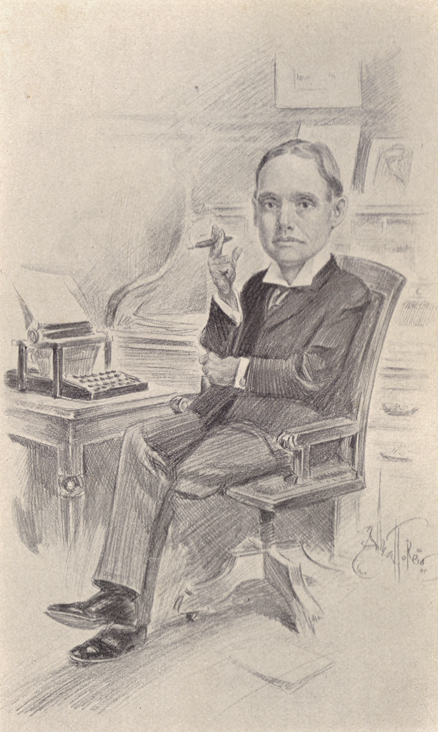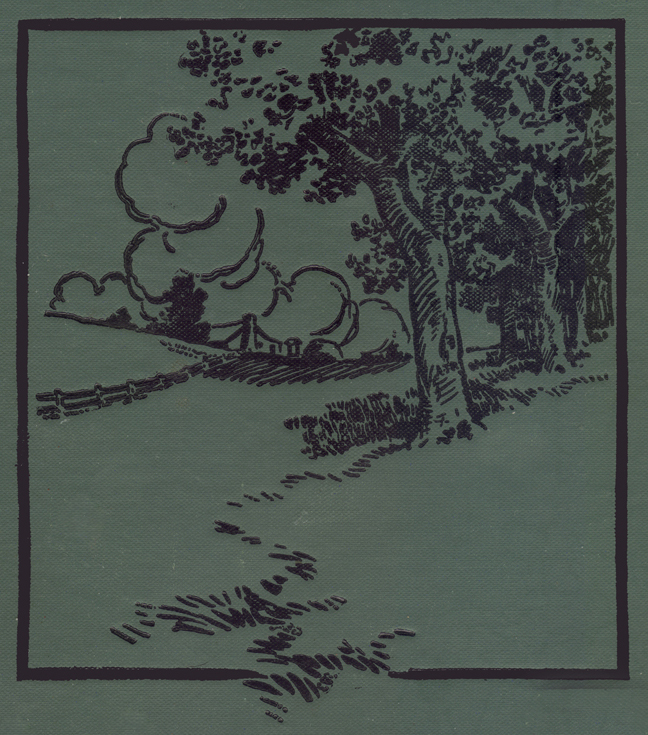
From At the Grass Roots, Comprising “The Christmas of 1883,” and Other Vagrant Sketches, by Elmer House (Dodd Gaston), with Cover Design and Frontispiece by Albert T. Reid, Topeka: Monotyped by Crane & Company, 1905; pp. 78-83.

I sometimes think there comes into the life of a man no more depressing influence than the realization that he is no longer a boy. The consciousness of youth is always an anchor to the windward. To be suddenly cut adrift from one’s boyhood makes rough sailing. Not long ago I went for a brief visit to the old home for the first time since grandmother died. For fifteen years the smooth waters of grandmother’s house were my port of refuge. It was the one place where I was always sure of a hearty welcome, rest, quite, comfort, and the coddling so dear to a masculine heart.
The world changed a good deal during those fifteen years, and I saw it at many different angles. But neither the face nor the atmosphere of that roomy, old-fashioned two-story farmhouse set 79 down between two hills ever altered. It was always restful and quiet there, and the sound of a footfall could be heard anywhere in the house. One could sit on the front porch and hear the big clock ticking in the dining-room, and in the evenings the only sounds that freighted to and fro upon the air were the chirping of the katydids and the occasional bark of a lonely dog.
Up in the garret of the old farmhouse there was the most wonderful array of curious things. A chest of drawres that came over ahead of Cornwallis stood in the half-light against the north wall, and in one of the drawers was a bundle of old, yellow, faded letters written home to North Carolina by a captain under “Mad Anthony” Wayne. In another were a lot of daguerreotypes of curious-looking people in impossible clothes. An old hair trunk sat under the east window, and above it hung a sword that followed General Zachary 80 Taylor to Mexico. In the trunk, folded carefully on top of a miscellaneous collection of other fabrics, was an old blue uniform, a hole in the right sleeve and the sleeve splashed and stained with blood. And like a row of sentinels, there hung from the rafters a long line of hoopskirts, derelict and abandoned by girls who had been country belles in the sixties.
I did not go often to grandmother’s house. Often there was a year, sometimes two or three years, between my visits. But I always knew I could take my incipient pneumonia there any time and have it fixed up with a mustard plaster on my chest. I knew my grandmother could tie a red-flannel rag around my sore throat and cure it overnight, and I knew that when I got ready to go away the holes in my hose would all be nicely darned. It never mattered how late I slept in the morning. The coffee-pot was always simmering gently on the back of 81 the stove and there was a pan of hot biscuits in the oven when I came downstairs. It never mattered, either, how low the canned fruit ran — it made no difference that a late frost came and killed the blossoms on the trees — a can of cherries was always set away against my coming. For while the world might forget that I was inordinately fond of cherry pie, grandmother never did.
She never understood me in the later years of her life, because we traveled different roads. Much that I did seemed foolish and frivolous to her. For I was at the age when pleasure was my watchword, and gaudy waistcoats, cravats and shirts the countersign I gave at the places into which I desired entrance. I remember she once chided me for some frippery cut to the contour of a shirt, which I was wearing, and to prove her case bought at the little country town store where she did her trading a shirt for 68 cents and presented it to me. She 82 claimed it was just as good as the more expensive garments I had been wearing; and that she might not be disappointed, I put it on and wore it like the soldier whose old blue uniform lay in the hair trunk upstairs. But, farther than that, she never criticised or questioned what I did, and I could be sure of her sympathy, no matter what happened.
Not long ago I went back. I knew that grandmother had gone the short journey from the home to which she went a bride in 1844 to the little cemetery on the hillside, but that was the least I had to learn. The landscape had not changed, but it no longer held an interest for me. The faces of the people were familiar, and they were kind, but they could not dispel the feeling of loneliness that gripped my heart, nor bring back that which had gone out of my life. I walked to the top of the hill overlooking the old house, saw alien figures about the place, and turned on my heel. And I 83 realized when I drove away next morning that I should never come — nor care to come — again. I knew, too, that the last link that bound me to boyhood had been riven, and that I was adrift on a troubled sea.
